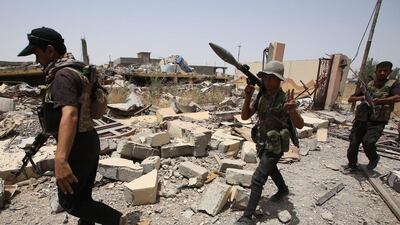Iran and the United States have found themselves on the same side of the battlefield against ISIL in Iraq. But while both are openly fighting to defeat ISIL, there continues to be a fierce competition between the two for greater influence within the troubled country.
The US has had no reservations voicing its concerns about Iran’s support for the mostly Shiite Popular Mobilisation Forces.
Washington fears that outside the authority of the central Iraqi government, the Shiite militia will undermine the state and hinder attempts to unify efforts to combat ISIL.
In March, US Army Gen Martin Dempsey warned about Iranian-backed militias, and asked about “what happens after the drums stop beating and ISIL is defeated”.
Throwing its weight behind Iraqi Shiite militias – said to number between 60,000 and 120,000 – is not simply Iran’s preferred method to combat ISIL, but also a means to expand its power in Iraq.
It follows a decades-long policy to extend Tehran’s influence in the region via non-state actors, said James Barry, Iran analyst at Melbourne’s Deakin University.
“They [Iran] always try to have actors within the countries themselves, and the Lebanese Hizbollah is a classic case of that. These Shiite militias in Iraq are also similar, and it goes back to what Iran’s been doing for a long time, which is to favour non-state actors as a means to influence neighbouring regimes,” Mr Barry said.
After the fall of Saddam Hussein in 2003, Iran has been competing with the US for influence over subsequent Shiite-led governments in Iraq.
“Since 2003, the Iranians have faced the following reality in Iraq: a Shiite-led state, but one that is closely assisted by the Americans. So the Iranians have had concerns about the long-term loyalty of the Iraqi political elite,” said Mehrzad Boroujerdi, a non-resident scholar at the Middle East Institute in Washington.
It should not be assumed that Iraqi Shiites constitute a single bloc that will automatically be subservient to the Islamic Republic by virtue of a shared faith, Mr Boroujerdi said, adding: “It is a gross exaggeration to claim that the Iraqi Shiites are Iran’s puppets.”
Iran will try to maintain a cordial relationship with various Iraqi Shiite groups, he said, “but they know that attempts at subordinating them will be futile”.
Backing Shiite militias gives Iran greater leverage to pressure the Iraqi government, as well as other Iraqi Shiite forces resistant to its influence. It also ensures that the Iranians are not left out of the decision-making process in Iraq.
But Washington’s push for a more inclusive Iraqi government that takes the lead in the fight against ISIL has, according to Iraqi analyst Harith Hasan Al Qarawee, prompted the Iranians to empower their militias.
“They will not support any restructuring of the army without making sure that their allies are able to make the strategic decisions. Otherwise, they will seek to empower militias and weaken official military forces,” said Mr Al Qarawee, fellow at the Radcliffe Institute for Advanced Study at Harvard University.
Analysts have previously cautioned that the power of Iraqi Shiite militias will be difficult to reverse after the war with ISIL, raising questions about Iran’s long-term objectives in Iraq.
Mr Boroujerdi believes Iran’s primary policy is to guarantee no repeat of an Iraqi invasion as per the Iran-Iraq War of the 1980s, and to make sure no Sunni government emerges in Baghdad.
It is also in Tehran’s interest to prevent Iraq from becoming strong and independent.
“If Iraq was stronger, it would be a serious competitor to Iran, particularly in oil exports,” Mr Barry said, adding that Iran would prefer a weak Shiite-led Iraq that was reliant on Iranian support.
Mr Al Qarawee agreed: “Iraq has become the main country for Iran to project its regional power. It is territorially the nearest to Iran and demographically the country with better potential to be led by Shiites.”
However, Mr Boroujerdi argued, “Iran does not want to see the disintegration of Iraq or see it as a failed state next door since terrorism and sectarian conflict can find its way into Iranian territory”.
This was made clear on May 24 when, according to a report in Al Monitor, the commander of the Iranian army’s ground forces Brig Gen Ahmad Reza Pourdastan warned a closed-parliament session of the growing threat of ISIL to Iran.
However, the situation in Iraq as it currently stands is not necessarily harming Iran’s interests.
The Shiite-dominated cities of Baghdad and Basra are largely secure, the central government is weak and increasingly beholden to the power of Iranian-backed militias.
Iran also enjoys significant influence in Iraqi Kurdistan.
“At the moment, Iran likes the status quo, a Shiite government in Baghdad, a Kurdish government in Erbil. They’re not happy about ISIL, but they think ISIL is containable,” Mr Barry said.
Mr Boroujerdi agrees that Iran will – for the time being – have to adopt a policy of containment of ISIL, granted the terrorist group does not cross its red lines.
“If ISIL was to become bold enough to attack Najaf, Karbala or Basra, the Iranians will not hesitate to send in their troops to fight them on Iraqi soil. These cities are Iran’s red line and they mean what they say about defending them against ISIL.”
In the end, the greater prize for Tehran will be to outbid the US as the primary influence over a weak Iraqi government.
“Their endgame is to have the most influence [in Iraq],” said Mr Barry.
“They want to be on the speed dial ahead of the Americans for the Iraqi president.”
foreign.desk@thenational.ae

